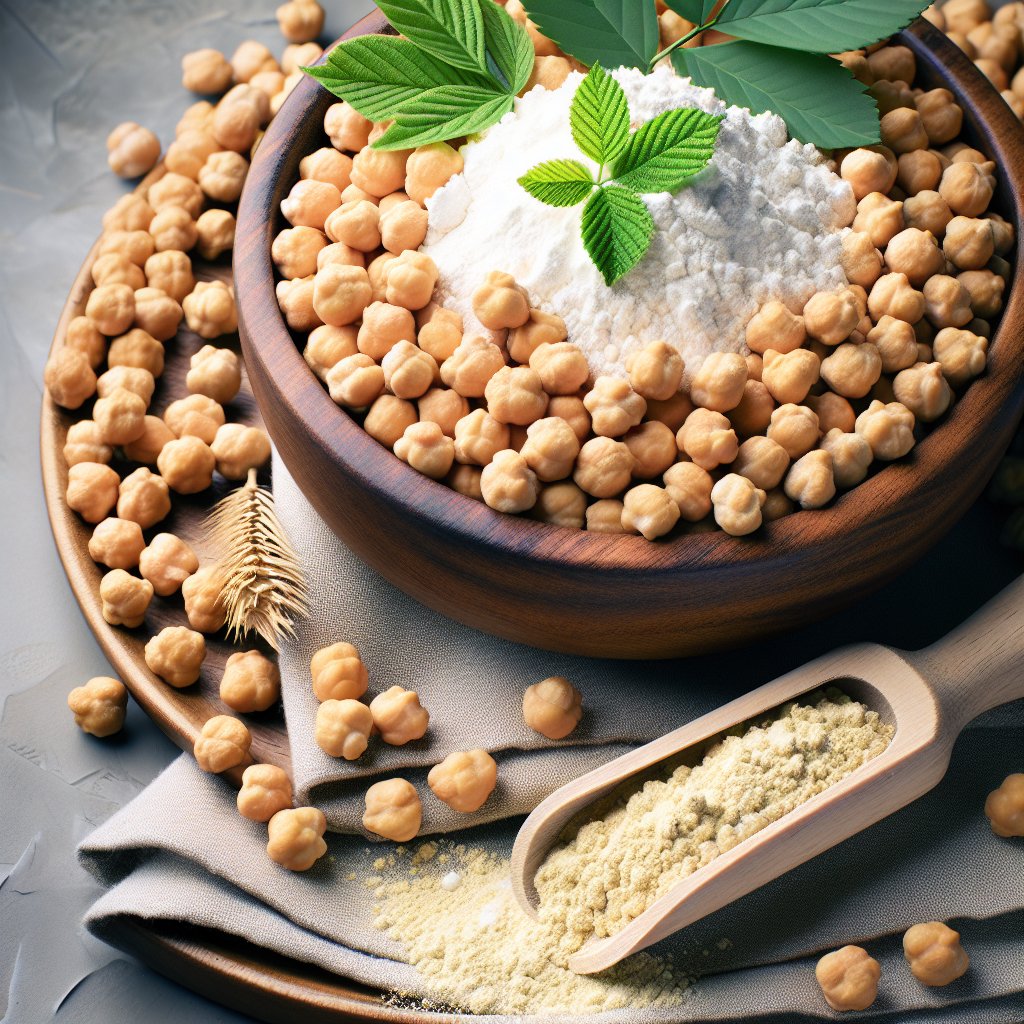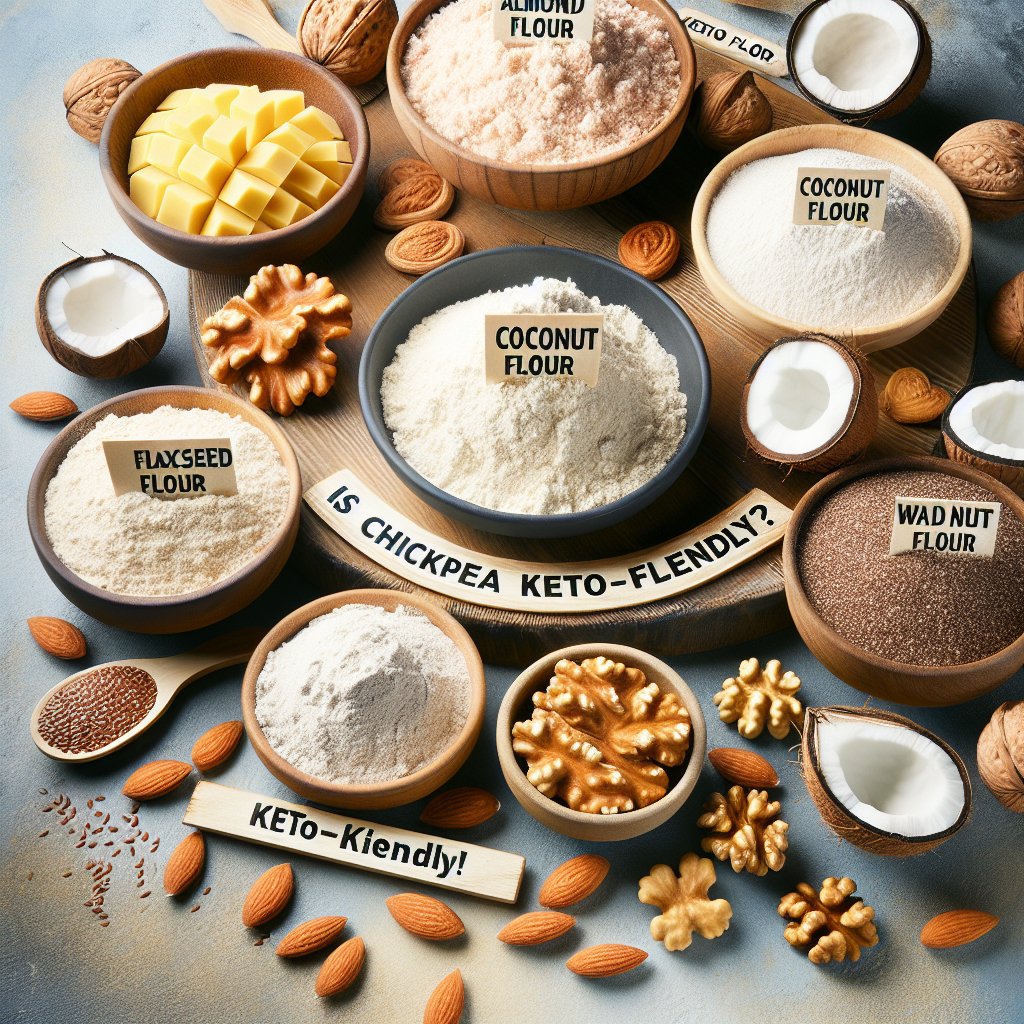Is Chickpea Flour Keto-Friendly? Unveiling the Truth About This Trendy Ingredient!
What is Chickpea Flour?
Chickpea flour, also known as gram flour or besan, is a gluten-free flour that is made by grinding dried chickpeas into a fine powder. It has been a staple ingredient in Indian, Middle Eastern, and Mediterranean cuisines for centuries.
Popularity in Various Cuisines
This versatile flour has gained popularity worldwide due to its nutty flavor, high protein content, and versatility in various dishes. In Indian cuisine, it’s used to make traditional dishes like besan chilla (gram flour pancakes) and pakoras (crispy fritters). In the Middle East, it’s a key ingredient in savory dishes like falafel. In the Mediterranean, chickpea flour is used to make farinata (a type of thin, unleavened pancake) and panisse (fried chickpea flour sticks). The popularity of chickpea flour has surged in Western countries as well, as more people are discovering its culinary versatility and health benefits.

Nutritional Information
Chickpea flour, also known as gram flour or besan, is a popular ingredient with a rich nutritional profile. Let’s dig into the macros and micros that make chickpea flour a fantastic addition to your ketogenic diet!
Macronutrient Profile
A 100-gram serving of chickpea flour contains approximately 58 grams of carbohydrates, 22 grams of protein, and 6.7 grams of fat. While the carb content may seem high, it’s essential to consider the net carb count, which is around 43 grams per 100 grams of chickpea flour. This calculation takes into account the fiber content, which is 15 grams per 100 grams. On a keto diet, monitoring net carbs is crucial, and chickpea flour can be incorporated into low-carb recipes in moderation.
Vitamins and Minerals
Chickpea flour is also a powerhouse of essential vitamins and minerals. It is particularly rich in folate, iron, phosphorus, and magnesium. Folate is essential for cell division and DNA synthesis, while iron is crucial for oxygen transport in the body. Additionally, phosphorus and magnesium play vital roles in bone health and muscle function, making chickpea flour a nutrient-dense choice for your ketogenic lifestyle.
With its favorable macronutrient profile and abundance of essential nutrients, chickpea flour can be a part of a well-balanced keto diet, adding variety and nutrition to your meals.
Ketogenic Diet Overview
So, you’ve heard about the ketogenic diet, but what exactly is it? Let’s dive in and uncover the basics of this popular nutritional approach that has taken the health and wellness world by storm.
The ketogenic diet, often referred to as the keto diet, is a high-fat, low-carbohydrate diet that offers various health benefits. It involves drastically reducing carbohydrate intake and replacing it with healthy fats, which puts the body in a metabolic state called ketosis. This metabolic state shifts the body’s primary energy source from glucose (sugar) to fat and ketones, resulting in efficient fat burning and weight loss.
When you limit carbohydrate intake, your body is forced to utilize fat for energy, leading to the production of ketones in the liver. This process effectively turns your body into a fat-burning machine. Additionally, the keto diet has shown promise in improving blood sugar control, enhancing mental clarity, and even providing therapeutic benefits for certain neurological conditions.
The ketogenic diet is not only about weight loss; it’s about optimizing your body’s performance and reaping the benefits of a low-carb, high-fat lifestyle. The emphasis on whole foods, healthy fats, and nutrient-dense ingredients makes it a sustainable approach for many individuals seeking a healthier way of eating. The keto diet encourages the consumption of foods like avocados, nuts, seeds, fatty fish, and low-carb vegetables, while minimizing processed and high-sugar items.
Evaluate the Compatibility of Chickpea Flour with the Ketogenic Diet
When it comes to the ketogenic diet, one of the most critical factors to consider is the carb content of any ingredient. Chickpea flour, while a popular and versatile ingredient, may raise questions about its compatibility with the keto lifestyle. Let’s delve into the specifics to see if chickpea flour can align with the principles of the ketogenic diet.
Chickpea flour, derived from ground chickpeas, is known for its high protein and fiber content. However, it contains a significant amount of carbohydrates as well. According to the United States Department of Agriculture (USDA), an ounce of chickpea flour contains approximately 18 grams of carbohydrates.
Understanding the Impact on Ketosis
Despite its high carb content, chickpea flour can still be used in keto-friendly recipes if consumed in moderation. Its glycemic index is lower than that of wheat flour, which means it can have a gentler impact on blood sugar levels, potentially supporting ketosis. Additionally, the fiber in chickpea flour can help slow down the absorption of carbs, further mitigating any adverse effects on ketosis.
Research published in the International Journal of Food Sciences and Nutrition suggests that incorporating chickpea flour in the diet can lead to improved glycemic control and enhanced satiety, making it a compelling option for those following a ketogenic lifestyle.
So, while chickpea flour does contain carbs, its potential impact on ketosis can be managed by incorporating it mindfully into a well-planned keto meal plan. When used as part of a balanced approach to carb intake, chickpea flour can indeed be compatible with the ketogenic diet.

Benefits of Chickpea Flour
Chickpea flour, also known as gram flour or besan, has been gaining popularity in the keto community for good reason. Not only is it a versatile ingredient for those following a ketogenic diet, but it also offers a variety of potential health benefits.
High Protein Content
One of the major benefits of chickpea flour is its high protein content. In fact, a 100-gram serving of chickpea flour provides approximately 22 grams of protein, making it an excellent plant-based protein source for individuals following a keto lifestyle. Protein is essential for muscle repair, growth, and overall body function, making chickpea flour a valuable addition to a keto-friendly diet.
Rich in Fiber
Another noteworthy benefit of chickpea flour is its high fiber content. Research has shown that a 100-gram serving of chickpea flour contains around 10 grams of dietary fiber. Fiber is crucial for promoting digestive health, supporting regular bowel movements, and aiding in the maintenance of a healthy weight. Additionally, consuming adequate fiber can help individuals feel fuller for longer periods, potentially reducing overall calorie intake, which is beneficial for those pursuing a ketogenic lifestyle.
Furthermore, the high fiber content of chickpea flour can contribute to improved blood sugar control and may have a positive impact on cholesterol levels. These factors are particularly important for individuals navigating the challenges of a keto diet.
With its notable protein and fiber content, chickpea flour emerges as a promising ingredient for those seeking to maintain ketosis while enjoying a diverse range of dishes.
Drawbacks of Chickpea Flour on Keto
While chickpea flour has gained popularity for its versatility and nutrient content, it does pose some drawbacks for those following a ketogenic diet. One of the primary concerns is its carb content. A 100-gram serving of chickpea flour contains approximately 58 grams of carbohydrates, with a significant portion coming from starch.
This high carb content can make it challenging to fit chickpea flour into the strict carb limits of a standard ketogenic diet, which typically recommends consuming no more than 20-50 grams of carbohydrates per day to achieve and maintain ketosis.
Moreover, chickpea flour has a moderate glycemic index, which means it can cause a more pronounced spike in blood sugar levels compared to other low-carb flours. This spike in blood sugar may hinder the body’s ability to enter and sustain ketosis, the metabolic state essential for reaping the benefits of a keto diet.
For individuals actively aiming to reach and stay in ketosis, consuming chickpea flour in large quantities or on a frequent basis could potentially impede their progress and make it harder to achieve their desired health and weight goals.
It’s essential for those following a ketogenic lifestyle to be mindful of the carb content of chickpea flour and consider alternative low-carb flours that align more closely with the macronutrient profile of a keto diet.
Alternatives to Chickpea Flour on Keto
While chickpea flour has gained popularity in recent years, it may not be the best option for those following a ketogenic diet due to its higher carb content. Fortunately, there are several low-carb flour alternatives that are more suitable for keto-friendly cooking and baking.
Almond Flour
Almond flour is a popular choice among keto enthusiasts. It is low in carbs and high in healthy fats, making it an excellent option for those following a ketogenic lifestyle. Almond flour can be used in a variety of recipes, including baked goods, bread, and pancakes.
Coconut Flour
Coconut flour is another fantastic low-carb alternative. It’s high in fiber and low in carbohydrates, making it suitable for keto-friendly recipes. Additionally, coconut flour adds a light texture to baked goods and is an excellent thickening agent for soups and sauces.
Flaxseed Meal
Flaxseed meal, made from ground flaxseeds, is an excellent source of omega-3 fatty acids and fiber. It is low in carbs and can be used as a flour substitute in various keto recipes, such as muffins, waffles, and crackers.
Psyllium Husk Powder
Psyllium husk powder is extremely low in digestible carbohydrates and high in fiber, making it a great choice for keto baking. It helps add moisture to baked goods and can be used to create a dough-like consistency in recipes.
When it comes to choosing the right low-carb flour for your keto lifestyle, these alternatives offer a wide range of options for creating delicious and satisfying meals while staying true to your dietary goals.

Recipes Using Chickpea Flour on Keto
Chickpea flour is a versatile and delicious ingredient that can be used in a variety of keto-friendly recipes. It’s high in protein and fiber, making it an excellent choice for those following a ketogenic diet. Here are a couple of mouth-watering recipes that incorporate chickpea flour and are perfect for anyone looking to stay in ketosis:
Keto Chickpea Flour Pancakes
Start your day off right with these fluffy and flavorful pancakes made with chickpea flour. In a bowl, mix 1/2 cup of chickpea flour, 1/4 teaspoon of baking powder, and a pinch of salt. In another bowl, whisk together 2 eggs, 1/4 cup of unsweetened almond milk, and 1 tablespoon of melted coconut oil. Combine the wet and dry ingredients and cook the pancakes on a hot griddle until golden brown. Serve with sugar-free syrup and a dollop of whipped cream for a delightful keto-friendly breakfast.
Keto Chickpea Flour Pizza Crust
If you’re craving pizza while on keto, this chickpea flour crust has got you covered. In a bowl, mix 1 1/2 cups of chickpea flour, 1/2 teaspoon of baking powder, 1/2 teaspoon of garlic powder, and a pinch of salt. Gradually add 1/2 cup of water and 1/4 cup of olive oil until the dough is formed. Roll it out into a thin crust, add your favorite low-carb toppings, and bake in a preheated oven at 425°F until the crust is crispy and golden. You won’t believe it’s keto-friendly!
These recipes showcase the incredible versatility of chickpea flour in the keto diet, providing a delicious means to indulge while staying in ketosis.
Conclusion: Is Chickpea Flour Keto-Friendly?
After deep-diving into the world of chickpea flour and its suitability for the ketogenic diet, it’s time to summarize the key points and provide a final recommendation on whether chickpea flour is keto-friendly. Let’s unveil the truth about this trendy ingredient!
Key Points Summarized
Throughout this article, we’ve delved into the nutritional profile of chickpea flour. We found that it’s high in protein and fiber, making it a wholesome and satisfying choice for those following a keto lifestyle. Furthermore, the lower glycemic index of chickpea flour can help in managing blood sugar levels, which is beneficial for maintaining ketosis.
Moreover, chickpea flour contains essential vitamins and minerals, such as folate, iron, and phosphorus, which contribute to overall health and well-being. It’s a versatile ingredient that can be used in a variety of keto-friendly recipes, from savory to sweet.
On the other hand, it’s important to note that chickpea flour does contain a higher amount of carbohydrates compared to other keto-approved flours like almond or coconut flour. This means it should be consumed in moderation to stay within the daily carb limits of the ketogenic diet.
Final Recommendation
Considering all the factors, chickpea flour can be deemed keto-friendly when used judiciously within the daily macronutrient intake. Its nutritional benefits make it a valuable inclusion in a well-rounded ketogenic diet, especially for those looking to add variety to their meals without compromising their health goals.
Therefore, our final recommendation is that chickpea flour can be enjoyed in keto recipes, as long as it fits within your daily carb allowance and is part of a balanced, diverse keto meal plan. It’s best to combine it with other low-carb flours and ingredients to create delicious, nutritionally dense dishes that support your keto journey. Embracing chickpea flour in moderation adds a delightful twist to your keto culinary adventures!


